
CGTN來“雙童”了!沒錯,就是最近在風口浪尖上的和美國FOX翠西約辯的那位劉欣大神所在的央視國際頻道CGTN來了!
上周五,CGTN的三位記者老師從上海千里迢迢趕赴“雙童”,對全球吸管行業的未來趨勢及“雙童”新產品——可食用淀粉吸管做了專題報道。快跟著吸管妞一起看看吧!
央視英語新聞頻道報道視頻
https://v.qq.com/x/page/c0879216jiq.html
瞧!樓仲平開啟煮吸管模式啦!他向記者介紹:雙童”可食用淀粉吸管完全采用小麥、大米、玉米、木薯、土豆等天然農作物淀粉,經高溫、高壓、熟化、擠出、烘干精制而成!最重要的是,它可以短時間內在任何生態環境下完全自然化解。
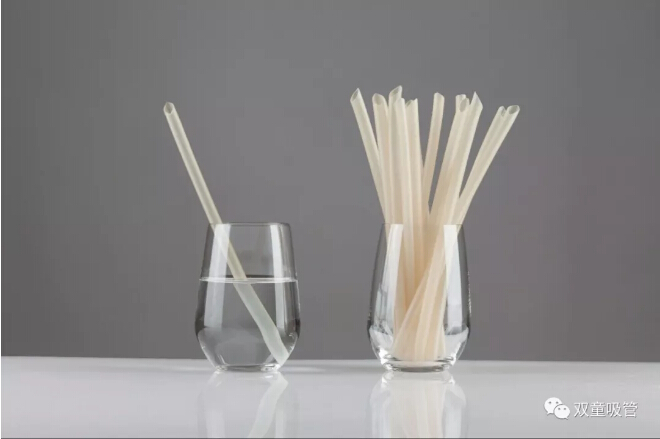
以天然淀粉為原料的可食用淀粉吸管
對抗塑料污染:企業生產出可食用淀粉吸管
央視英語新聞頻道 記者:韓鵬
翻譯稿:
研究人員聲稱,世界各地的海岸線上散落著近83億根塑料吸管。日益嚴重的塑料垃圾問題,引發了消費者們進行了一場停用塑料吸管的運動,在中國也是一樣。在6月5日世界環境日前夕,CGTN報道了中國抗擊污染的幾則新聞。
你敢相信嗎?吸管可以像面條一樣煮起來吃!雙童吸管董事長樓仲平說,他的公司最新研發的吸管不僅非常環保,還可以吃。這種吸管在沸水中,只需幾分鐘就能煮熟,煮熟后即可食用。
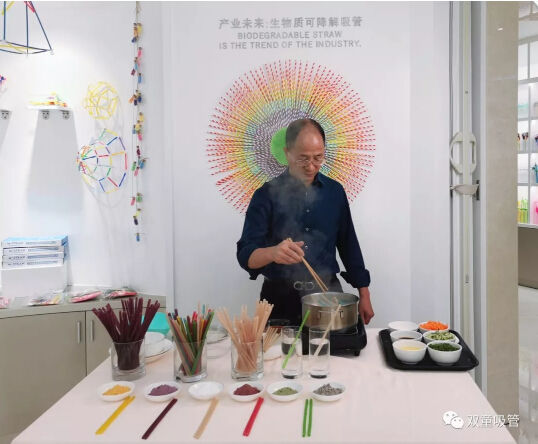
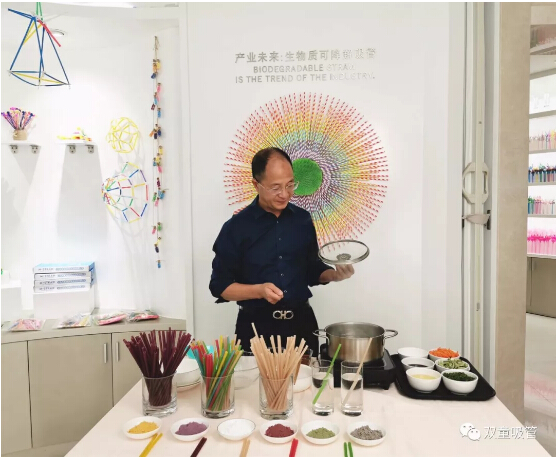
樓仲平正在煮淀粉吸管
樓仲平說:“這些吸管是用天然淀粉制成的,關鍵是如果人類能夠食用和消化這些吸管,那么大自然也可以!‘’
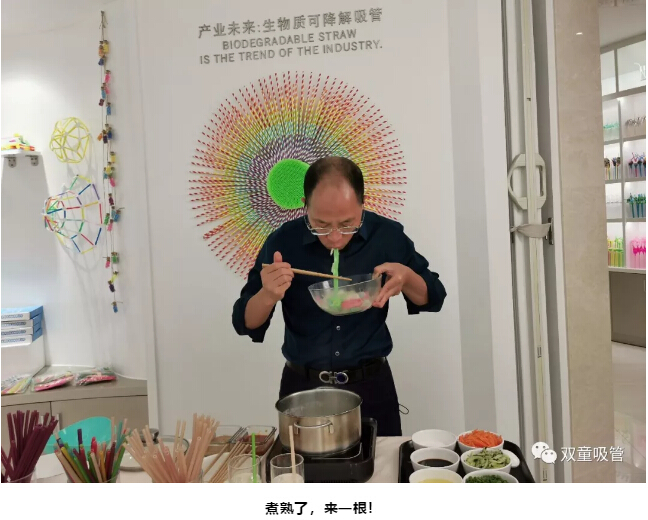
樓仲平的公司是世界上最大的吸管生產商之一。在中國小商品之都義烏,樓仲平是一個隱藏在眾多飲料品牌背后的億萬富翁。
塑料吸管是由聚乙烯顆粒制成的,這家工廠每秒鐘能生產出6000根吸管。
但目前蓬勃發展的塑料吸管生產線未來很可能會消失。在中國,塑料垃圾對海洋動物造成嚴重危害的照片在社交網站上流傳,這引發了全國民眾的憤怒。
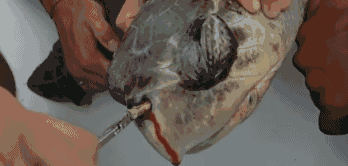
海龜鼻子里插進塑料吸管
在世界各地,包括英國和美國在內的國家,已經開始呼吁停止使用塑料吸管。在上海,星巴克是宣布停止使用塑料吸管的眾多品牌之一。
上海星巴克的店員表示:“不是所有的顧客都能接受這個想法,但我們向他們解釋,這樣做是為了我們的后代。”
與塑料吸管相比,紙質吸管更容易軟化,但這也意味著它更容易降解。
一些國內的咖啡廳和奶茶店已經開始用紙質吸管代替塑料吸管。
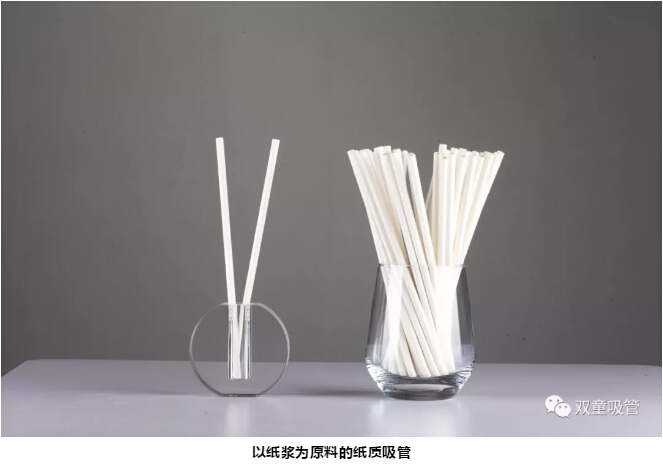
韓鵬說:“用吸管喝完一杯咖啡需要半個小時。但如果是塑料吸管,它在地球上的自然降解需要將近五百年的時間。”
樓仲平知道,他的產品如果變革得不夠快,就有可能損失數十億美元的利潤。目前,他正積極地用紙質吸管生產線來取代原有的生產線,但他并不滿足于此。
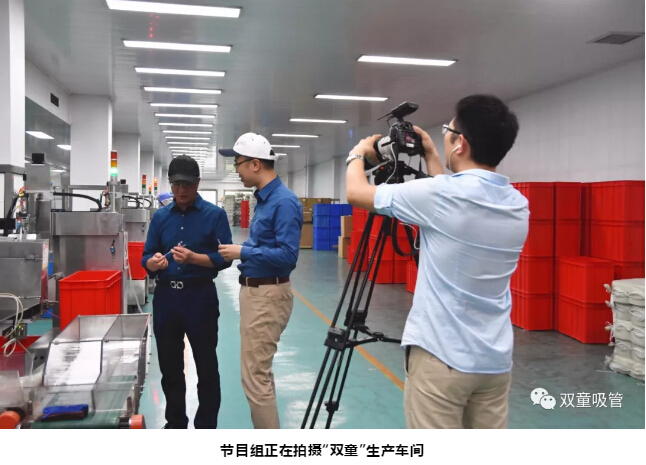
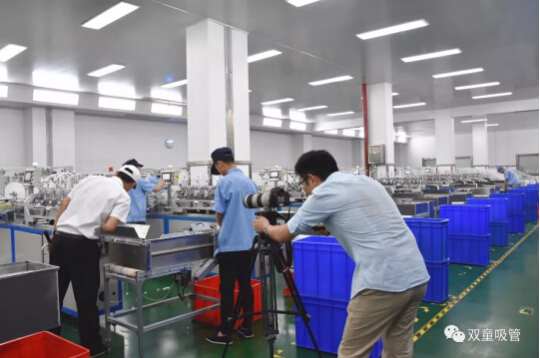
節目組對每一道生產工序的拍攝都一絲不茍
“紙質吸管也有巨大的環境成本,在生產過程中需要砍伐大量的樹木,還會排放出大量污染物,將來或許還會引發另一場環保運動。 因此,我們成為了最早開發淀粉吸管的公司之一。但我們仍然在努力研究減緩它在水中浸泡后的軟化速度的方法。”樓仲平說。
這位54歲的吸管大王在14歲時輟學,靠街頭販賣為生。
1993年,他建立了中國最早的吸管生產企業之一。如今,面對嚴峻的塑料污染問題,他想要徹底改造吸管。
英文原稿
Fighting Plastic Pollution:
Firm makes clean straws that can be eaten
Reporter: Han Peng
Researchers say up to 8.3 billion plastic drinking straws litter the worlds coastlines. The daunting plastic waste problem is triggering campaigns to get consumers to stop using plastic straws, including in China. In the run-up to World Environment Day on June 5th, CGTN has several stories on China's fight against pollution. Han Peng starts it off with a new way of thinking about straws.
Can you believe what this man is doing? With just a few minutes of boiling, he says his newly invented drinking straws are so environment-friendly that they can be cooked. AND EATEN.
LOU ZHONGPING, PRESIDENT SOTON DRINKING STRAWS "The straws are made out of starch. The point is: If humans can eat and digest these straws, then nature can as well."
Lou Zhongping presides over one of the world's largest companies making nothing else but drinking straws. Based in China's capital of small commodities, Yiwu, Lou is a hidden billionaire behind many global beverage brands.
HAN PENG YIWU "Plastic straws are made of polyethylenes like this, and this factory can produce 6,000 straws every second."
But his booming plastic production lines could be heading to a dead end. In China, photos of plastic waste causing lifelong suffering of sea animals circulate on social networking sites, sparking nationwide outrage. Around the world, countries including the UK and US have begun calling for a ban on plastic straws. And here in Shanghai, Starbucks is among the many brands that announced it will stop using plastic straws.
JI LINGYUN, BARISTA STARBUCKS "Not all the customers like the idea, but we explain to them that we are doing this for the sake of our future generations."
Compared to plastic, paper straws can easily soften, but it also means it's easier to degrade.
Some domestic coffee and bubble tea vendors are replacing plastic with paper.
HAN PENG SHANGHAI "It takes half an hour to drink a cup of coffee with a straw, but if it's plastic, it will take nearly half a millennium for the earth to finally digest and degrade all the plastic waste."
Back in Yiwu, Lou understands he stands to lose billions in profit if he does not move fast. He's aggressively replacing old machines with paper straw production lines. But he is not satisfied with just that.
LOU ZHONGPING, PRESIDENT SOTON DRINKING STRAWS "Paper straws have huge environmental costs, too. You need to cut down trees and emit pollutants during production. So someday there might be another campaign. That's why we are one of the earliest to develop starch-based straws. But we are still working on how to slow down its softening process, after being immersed for one hour."
The 54-year-old straw tycoon dropped out of school at the age of 14, and made a living through street-vending.
He built one of China's earliest plastic straw workshops in 1993. Today, he wants to reinvent straws in the face of daunting plastic pollution. Han Peng, CGTN, from Shanghai and Yiwu.